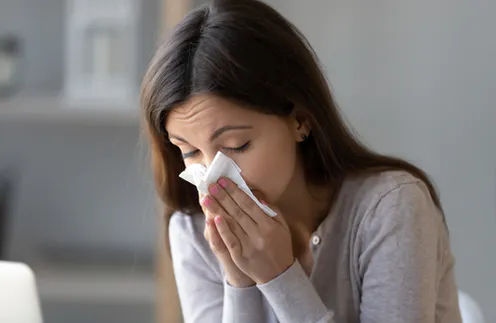If you’ve been enjoying the warmer temps in the Valley, you may have noticed in increase in pesky allergy symptoms. With allergy season in full force, there are some easy ways you can help keep your spring allergies at bay. Here are four tips and tricks from Dr. Julie Wendt at Relieve Allergy in Scottsdale with everything you need to know:
READ ALSO: As the drought persists, here’s how Phoenix is prepared
1. Make Your Indoor Environment a Sanctuary
Keeping your indoor environment a sanctuary is key to reducing allergies. You can do this by keeping the doors and windows of your home closed and let the air conditioning and heating do the work for you. Change your air filters regularly, even more often during allergy season. You can also consider getting an air purifier.

2. Keep Your Pets Clean
Our furry friends go in and out all day long, so keeping them clean is vital for reducing allergens in our home. Simply give them a quick wipe down with a baby or pet wipe as soon as they come back into the house.
3. Leave Your Clothes at the Door
Leave your shirt and shoes at the door and change into washed clothes once you get inside your home preventing the mistake of carrying pollen all over your house and on your furniture. Make sure to shower before bed to prevent taking any pollen to sleep with you.
4. Rinse Your Target Organs
Irritated target organs such as your nose and eyes are a tell-tale sign you may be suffering from allergies. If your nose bothers you, try using a sinus rinse. For irritated eyes, rinse with a refrigerated sterile buffered saline.
Dr. Wendt recommends seeing an allergist if you cannot control your symptoms with allergy medication and the above tips alone. Reasons to see an allergist include failure and overuse of medication, raising concerns of side effects, not feeling functional while on the medication and embarrassment from constant coughing, mucus running down your nose and red eyes.
“There are many valid reasons to see an Allergist,” says Dr. Wendt. “If you think there might be something more going on, something more serious or you just don’t want to take another drug or risk drug side effects and interactions.” Severe allergy effects can include difficulty sleeping, sinus infections, bronchitis, inability to concentrate and brain fog.
Erica Shipione contributed to this story.
Author: Dr. Julie Wendt earned Bachelor of Science degrees in biochemistry and biology honors from the University of Illinois, a Ph.D. in microbiology and immunology from Vanderbilt University and a Doctor of Medicine degree from the University of Tennessee College of Medicine. She completed residency at Rush-Presbyterian-St. Luke’s Medical Center and an allergy and immunology fellowship at Rush University Medical Center, both in Chicago. In private practice since 2005, Dr. Wendt has published a great deal of research. She has received the American Medical Association Physician’s Recognition Award, a Patient’s Choice Award and is noted as one of America’s Top Physicians. Dr. Wendt is former President of the Arizona Allergy and Asthma Society. For more information, visit https://relieveallergyaz.com/.




